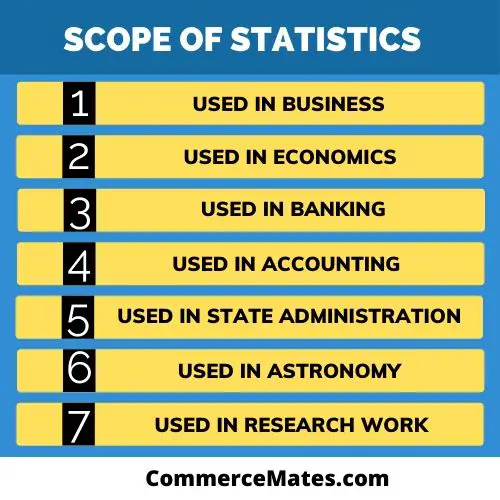Contents
Meaning of Statistics
Statistics is a mathematics discipline that involves the collection of data, organizing, analyzing, interpreting, and presenting it fairly for drawing conclusions. It is the one that uses various quantitative tools for gathering and evaluating large sets of data.
Statistics is an efficient tool that helps the business in making efficient and well-informed decisions. It is used by various fields such as economics, science, medicine, marketing, psychology, and politics.
Statistics helps in converting the acquired raw data into key information which is helpful for developing better understanding and sound decision making. Business with the application of statistical tools is able to make a better plan by making accurate assumptions and predictions.
They are able to handle future uncertainties in a better way by predicting cyclical and general economic fluctuations. Statistics is classified into two categories that are descriptive and inferential statistics.
Application and Scope of Statistics

Used In Business
scope of statistics plays a key role in the well-functioning of business organizations. Businessmen are required to take various decisions for carrying out different operations timely and properly. Business is full of uncertainties and statistics helps in taking wise decisions.
Statistical tools enable in designing the production activities and delivering goods in accordance with the needs of customers. Business relies on statistical information for taking various decisions such as pricing, marketing, financial resources, etc.
Used In Economics
Economics and statistics are two interrelated terms and are used with one another. The two terms can’t be separated from each other. Statistics is used for the purpose of collecting, analyzing, comparing, and presentation of data. It almost all branches of economics like production, consumption, distribution, etc.
It also use to measuring of demand-supply, calculating GDP and per capita income, for import-export and inflation rates. It solve the economical problems by providing the numerical data.
Used In Banking
Banking is another big sector where scope of statistics is used for carrying out operations. These institutions mainly earn revenue by lending money to the public out of the deposits received by them.
Bank charge interest rates for lending loans then they give low interest on saving accounts. Difference between these two is their profit. Banks depend upon statistical tools for deciding the appropriate proportion of lending amount out of the deposits held by them.
Used In Accounting And Auditing
The scope of statistics has an efficient role in both the auditing and accounting field. Auditing involves choosing and evaluating the sample for verifying the correctness.
Statistics are used by auditors for selecting the sample size for checking out errors. Whereas, in accounting, it is used for taking various decisions on the basis of approximation. The values of current assets are corrected on the basis of its current value or money’s purchasing power.
Used In State Administration
The scope of statistics also includes information that is used by the government for its administrative activities. It is used by public authorities for framing various policies and taking corrective decisions.
Statistical data helps them in revising pay scales, dearness allowances of employees, and also in formulating family planning programs. The government while preparing budgets uses statistics for estimating its expenditure and revenue from different sources.
Used In Astronomy
It is another important branch where statistical tools are widely used. Astronomy measures the masses, size, distance, and densities of heavenly bodies.
Errors are unavoidable while measuring various aspects of this field. Statistical methods are used for making the most probable measurements while doing different calculations between heavenly bodies.
Used In Research Work
The scope of statistics also includes the area of research work that requires statistics for doing each and every activity. It is almost impossible to conduct research in the
absence of statistics. Researchers use statistics for evaluating problems under distinct conditions. A person doing research should possess the proper knowledge and skills of this subject for finding out better results.